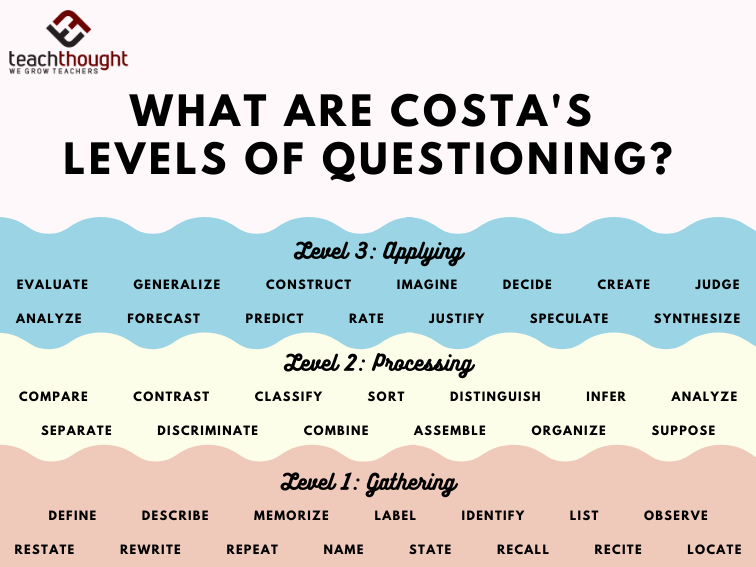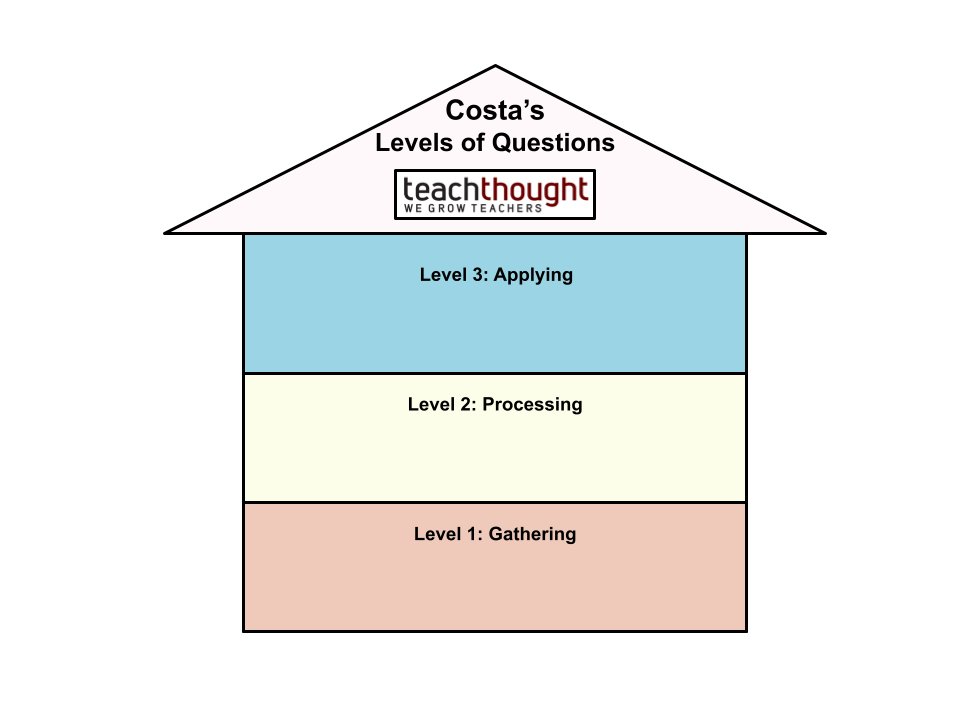

Costa’s Levels of Questioning– designed by academic scientist Art Costa– feature three tiers of examining developed to advertise higher-level thinking and query.
Similar to Bloom’s taxonomy , Costa’s lower degree motivates pupils to use even more standard faculties; as trainees move up in levels, the concerns prompt them to use more complicated reasoning abilities. With years of research study on human resilience, Dr. Costa likewise recognized the 16 Practices of Mind , a set of actions that support students in browsing the difficulties that usually occur in institution and life, as a whole. Several of Dr. Costa’s 16 practices– believing interdependently, introducing, collecting data, and applying past knowledge to new situations– both require and strengthen higher degrees of wondering about.
There is a substantive amount of research that supports Dr. Costa’s schema. Newmann (1993 found that higher-order assuming compels students to “control info and ideas in manner ins which change their significance,” and “anticipates students to address troubles and create suggesting on their own,” which straightens with a constructivist view of education and learning
Costa’s Degrees of Examining are generally illustrated using the metaphor of a home with 3 floorings:


Degree 1: Gathering
Degree 1 questions generally need pupils to work with details ‘on the web page.’ Solution to level 1 inquiries are generally actual; significance, a student can actually point to the answer on a web page.
We have actually formerly written about Bloom’s Taxonomy power verbs , so you can predict that Costa’s degrees have their very own set of power verbs, too. Below are a couple of that you might locate at the start of Degree 1 concerns:
- Specify
- Explain
- Remember
- Label
- Identify
- List
- Observe
- Reiterate
- Revise
- Repeat
- Call
- State
- Recall
- Recite
- Situate
- Select
- Suit
- Show
Degree 1 concerns by content location could resemble these examples:
- Scientific research : Tag the parts of a pet cell.
- Math : Recite the formula for finding the volume of a cyndrical tube.
- History : Suit the name of the monarch to their particular nation.
- English Language Arts : Locate the place in the plot where the climax occurs.
You can see exactly how most of these Degree 1 power verbs call for students to remember info, which is an important skill in its very own right. Nevertheless, instructors need to strive for the majority of their concerns to fall in Level 2 or 3, which challenge pupils to make use of higher-order reasoning abilities.
Level 2: Handling
Degree 2 concerns go a step better than Level 1, triggering students to process information by ‘reading in between the lines.’ While trainees might require to use literal information to develop their responses, Level 2 requires them to refine that info with what they currently understand in order to make brand-new connections.
Here are some instances of Level 2 power verbs:
- Compare
- Contrast
- Categorize
- Kind
- Distinguish
- Infer
- Analyze
- Separate
- Differentiate
- Combine
- Put together
- Organize
- Mean
Level 2 questions by material area may turn up in the following methods:
- Scientific research : Contrast the procedures of mitosis and meiosis.
- Mathematics : Identify the geometric shapes according to their variety of sides and angles.
- History : Put together the following historic events in the order of importance, from most to the very least.
- English Language Arts : Analy ze the impact that the author’s tone carries the total definition of the message.
Can you see exactly how Degree 2 inquiries go an action further than Degree 1 Greater than simply throwing up info, learners take it and ‘do something’ with it. They categorize, make differences, and compare/contrast it versus an additional component to see exactly how it affects the entire. These type of abilities can promote curiosity and develop a bridge to the inquiries that truly generate creativity and higher-level thinking.
Level 3: Applying
While Degree 1 concerns prompt students to collaborate with input, and Degree 2 inquiries challenge them to process that input in order to make new connections. Here, pupils participate in the highest-level reasoning abilities to create an outcome. This can result from making examinations and evaluations, screening services to various problems, or making forecasts.
We’ve included some examples of Degree 3 power verbs listed below:
- Assess
- Generalize
- Build
- Envision
- Make a decision
- Develop
- Judge
- Evaluate
- Forecast
- If/then
- Forecast
- Rate
- Validate
- Speculate
- Synthesize
- Develop
- Assume
Degree 3 questions by material location could resemble the following:
- Science : Based upon data from the last decade of typhoon task in the southeast U.S., forecast just how the frequency of storm activity will change in the following ten years.
- Math : Rate the possibility of a presidential candidate winning the election based on protecting the electoral ballots from the complying with U.S. states: Florida, The Golden State, Virginia, New York, Illinois.
- History : Create a social compact that thinks about the results of globalization and technological improvement in the 21 st century.
- English Language Arts : Build a disagreement that defends or shoots down compulsory worker inoculation plans in the United States.
Whether preparing for discussion-based activities, project-based understanding, or independent questions, instructors ought to make every effort to orient the majority of pupil reasoning and engagement at Degrees 2 and 3 Evaluations that motivate students to recall fundamental realities (such as the day of a historical event, or the name of a writer, or the formula for a formula) don’t really assess trainees’ ability to apply brand-new abilities or info to new contexts. A Degree 2 or 3 concern would certainly test pupils to make links with basic details. For instance, as opposed to recalling a plain date, a more flexible inquiry would certainly ask pupils to anticipate, based upon the moment in background that a particular occasion occurred, the probability of it reoccuring, provided a comparable sociopolitical environment. Along the very same lines, instead of remembering the names of popular writers, a teacher could challenge trainees to make a disagreement for exactly how an author would certainly discuss a certain modern issue.
In “A Talk with Teachers,” James Baldwin defined the paradox of education and learning: “As one begins to become aware, one begins to check out the culture in which [they] are educated.” Degree 2 (and mostly, level 3 questions intend to cultivate this kind of response in trainees, to cause them to turn their heads, do double-takes, mention inconsistencies, interfere with the status quo, recognize imperfections in present establishments, and produce cutting-edge solutions for those imperfections. These are the questions that motivate us ahead up with more questions, to think about our reasoning, and to develop– both as people and societies.